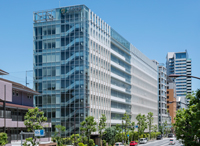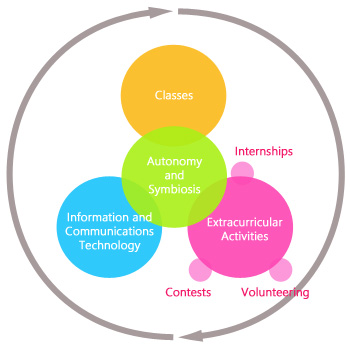
HIROO GAKUEN
Hiroo Gakuen is a co-educational college preparatory school located in central Tokyo, with a student population of over 1,500 across grades 7 to 12. The curriculum is approved by the Japanese Ministry of Education, and students graduate with a Japanese National Graduation Certificate.
In 2007 Hiroo Gakuen established an international course of study to cater to the needs of a growing and increasingly diverse student population. The majority of international course classes are taught in English by native English speaking subject specialists (Japanese, PE, Home Economics, and Health are taught in Japanese). International students are therefore able to receive a Japanese High School Certificate, as well as become prepared for the academic rigors of college abroad or in Japan.

School Motto / Educational Philosophy:
The educational philosophy of Hiroo Gakuen is Autonomy and Symbiosis.
Based on this philosophy, we have three courses created in an environment where students can not only work to make themselves the best that they can be, but also work together in doing so. The strength of our education encourages each student to reach for higher levels all the while looking to find ways in which they can help others.
Objective: We aim for our students to develop into responsible, global-minded citizens.
Life and learning at Hiroo Gakuen extends well beyond the confines of the traditional classroom. While academic study lays the foundation of education, Hiroo Gakuen students are both provided with and encouraged to seek opportunities in which they can put their knowledge, skills to practical use and develop themselves to prepare to become tomorrow's leaders.
Three Courses
The academic curriculum of Hiroo Gakuen is based on that set by the Japanese Board of Education and the school is certified as an "ichijou" school, from which students receive Japanese National Graduation Certificates upon graduation.
Students at Hiroo Gakuen are enrolled in one of the following three courses of study:
(1) a domestic course in which most subjects are taught in Japanese, and the students enter either a science track or a humanities track for their final two years.
(2) a medical and science course in which most subjects are taught in Japanese to students specializing in medicine and science.
(3) an international course in which most subjects are taught in English. In addition to a set of core subjects, students choose from a range of elective subjects to extend and refine their academic focus. Students can take AP courses and exams in the last two years of high school.

University Results
- English Contents
-
- Our History
- International Course
- Junior High School International Course
- Junior High School Returnee Student Entrance Exam Admission Guidelines
- Junior High School International Transfer Student Exam Admission Guidelines
- Senior High School International Course
- Senior High School Returnee Student Entrance Exam Admission Guidelines
- Senior High School International Transfer Student Exam Admission Guidelines
- Map
- Inquiries
- Request Guidebook
- Web Pamphlet
